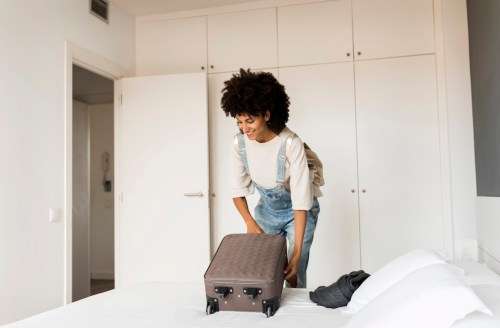How To Decide If It’s Safe To Stay in a Hotel Right Now
Months of laying low has made many of us beyond ready for a vacation. But is it even safe to stay in a hotel? Here's what experts want you to know.

Months of laying low and getting well acquainted with our own spaces has made many of us beyond ready for a vacation. But like most things, visiting a hotel isn’t what it used to be. Is it even safe to stay in a hotel? As long as the hotel is taking proper precautions, Brian Labus, PhD, MPH, an infectious disease epidemiologist and public health professor at the University of Nevada, Las Vegas, says you’ll probably be okay.
Experts in This Article
infectious disease epidemiologist and public health professor at the University of Nevada, Las Vegas
chief medical officer of the Association of State and Territorial Health Officials
“The challenge with hotels is that you are away from home and you don’t have control over your environment,” says Dr. Labus. “That’s going to add some risk because you have to go through spaces where there are going to be other people and you can’t avoid contact with them. However, if you look at what hotels have been doing around the country, they’ve been reducing occupancy, putting in plans to clean, and designing their spaces to minimize that sort of contact and protect all their guests.”
To stay safe, Marcus Plescia, MD, MPH, chief medical officer of the Association of State and Territorial Health Officials, says you the first question you should ask when booking is: “What precautions are you taking?”
“A good establishment is going to be able to answer that question,” says Dr. Plescia. “They have trained their people, if the customer’s asking that question, they want the customer to leave that conversation fully satisfied. If you really have to prod and ask a bunch of questions—’Well, are you doing this? Are you doing that?’—that would be a red flag.”
When you stay at a hotel, all employees should be wearing masks at all times and front desks should have plexiglass barriers or ample space to maintain distance from the concierge. You should note signage used to discourage crowding in places like elevators (though if you can, avoid the elevators altogether, says Dr. Plescia). Some hotels are allowing 24 to 48 hours between stays, giving rooms time to air out.
If you choose to stay at hotel right now, do your best to minimize person-to-person contact from the point and check-in and throughout your stay. “If the hotel offers a keyless check-in, where you can do it all through your phone, that’s best because you just don’t have to really interact with anybody,” says Dr. Plescia. If you order room service, have them leave it outside of your door. Additionally, choose to forego room cleaning during your stay. “You don’t want to be concerned about anybody coming into the room to do cleaning or replace towels or anything,” says Dr. Plescia.
Places like motels or rentable cabins in the woods might seem more attractive because there are no big lobbies or elevators to avoid, but Dr. Labus says to be sure to take into account everything a larger hotel might do to ensure your safety. “Even if you have your own separate building, but everybody’s going to the same restaurant because you’re out in the woods and there’s nothing else around, that could pose some risk right there,” says Dr. Labus. “You have to just look at the overall situation and see if it’s one that’s going to keep you away from other people.”
When it comes to duvet covers, pillows, and bath towels, Dr. Labus says you shouldn’t be too concerned. “They’re going to change the linen between guests, so that’s not a problem right there,” he says. “They’re cleaning the rooms and handling those things appropriately. And even if they’re not, those are minor modes of transmission compared to being around other people.”
To err on the side of safety, Dr. Plescia recommends bringing your own pillow and pillowcase. “Your face is going to be on the pillow, so I think that’s a reasonable precaution,” he says. “But if you can’t do that, it’s probably fine. A reputable hotel is going to have laundered the pillowcases as well. Maybe pack an extra suitcase with your pillows in it, if you can.”
As long as you have a mask on in communal areas like lobbies, you shouldn’t worry about the air conditioners, says Dr. Plescia. The units generally recirculate air within your room, they don’t drag it from room to room.
“Ventilation systems can blow the virus around,” he says. “If there’s somebody coughing right in front of the fan, it can spread that virus around a decent distance from wherever that vent is. That’s really the concern—[the virus] isn’t likely to come into your room through the vents.”
Even during normal times, Dr. Labus says you don’t spend much time interacting with other guests. The major risk of travel lies in how you get to your destination and what you do when you get there.
“If you’re traveling somewhere on an airplane, the journey can often be a lot riskier,” he says. “If you’re driving cross country, that doesn’t apply. But if you’re flying somewhere, it’s a challenging situation to navigate. And then if you arrive somewhere, if you’re doing things at that location, site seeing or visiting friends or family, you’re going to be in close contact with other people for an extended period of time, and those things tend to be much higher risk.”
Sign Up for Our Daily Newsletter
Get all the latest in wellness, trends, food, fitness, beauty, and more delivered right to your inbox.
Got it, you've been added to our email list.








